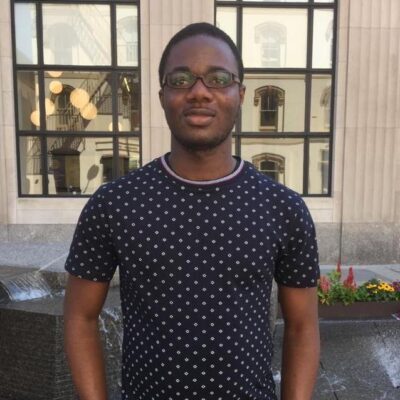Student Spotlight: Chijioke Onah

May 8, 2023
Chijioke Onah is a doctoral student in English language and literature specializing in Black studies and environmental humanities from Iheakpu-Awka, in Enugu State, Nigeria. He earned his bachelor’s degree at the University of Nigeria, Nsukka and his master’s degree at Goethe University of Frankfurt, Germany and now studies the ecological violence of toxic waste and pollutants in African and Black communities under the guidance of Caroline Levine and Naminata Diabate at Cornell.
What is your area of research and why is it important?
My doctoral dissertation is focused on the ecological violence of toxic waste and pollutants in African and Black communities globally. Given the environmental and health implication of living in proximity to toxic waste and pollutants as many Black and minority groups do, my research shows how African and African-descendant people globally are conditioned to inhabit these toxic landscapes. This kind of violence is often not recognized, yet it is both pervasive and lethal. My research underscores these kinds of violence, but it also positions these communities as models of how to live ethically and sustainably in a toxic saturated world.
What are the larger implications of this research?
We currently live in a world saturated with toxicity. Whether it is from lead poisoning, oil spills, electronic, nuclear, or industrial waste; there is no escaping toxicity. However, advanced countries routinely export these hazardous materials to countries of the global south, or site these harmful matters within minority communities in the west. My research shows how these practices have enormous social and environmental consequences for Black and minority communities as well as for our collective planetary future. By placing environmental justice at the core of the current ecological crisis, I hope to articulate sustainable forms of living in this toxic saturated world.
What does it mean to you to have been selected as a Mellon/ACLS Dissertation Innovation Fellow?
To be named a Mellon/ACLS Dissertation Innovation Fellow is to be recognized alongside other extraordinarily talented scholars. It feels like a validation of my research and the various work I have done over the years. But I do see it much as a push to do more rather than simply a validation of past efforts. The financial resources that it offers also have significant implications for me and for my research. I personally take mentorship seriously. This makes me really thrilled about the prospect of having an external mentor who will complement my extraordinary dissertation committee at Cornell.
What will this fellowship allow you to do that you might not have otherwise?
As a literatures in English Ph.D. student, our major funding often comes from teaching the first-year writing seminar (FWS). This fellowship offers me an extra year of funding without the demands of teaching. Even though I enjoy teaching, it is often time intensive and leaves little room for research. This is even worse for me as a student-parent. With this fellowship, I can devote my time completely to my dissertation and other research projects. With this freedom and the financial support of the fellowship and the Graduate School, I will also be able to do extra fieldwork in Nigeria and Ghana.
What are your hobbies or interests outside of your research or scholarship?
I spend a lot of my free time with my wife and my daughter. That comes with a lot of crazy activities, such as singing and dancing that you won’t find me doing outside. Otherwise, we are just chatting or playing at home. I also love spending time with friends, taking a walk, or discussing politics.
Why did you choose Cornell to pursue your degree?
My choice of Cornell was accidental and tragic. I came to the United States in August 2019 to work with the legendary Prof. Tejumola Olaniyan of the University of Wisconsin-Madison. Unfortunately, Prof. Olaniyan died tragically in November 2019. I knew for sure that I wouldn’t be able to continue at Madison. Confused, I decided to apply to Cornell where Prof. Olaniyan himself was trained. That was how I came to Cornell. I continue to remember Prof. Olaniyan for the influence he had on my career, and for the paths he had cleared for me.
